
The pig frog is a species of aquatic frog found in the Southeastern United States, from South Carolina to Texas. Some sources also refer to it as the lagoon frog or the southern bullfrog.
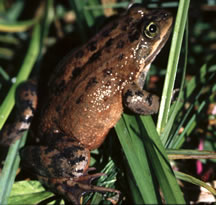
The Oregon spotted frog is a member of the frog family Ranidae of order Anura. It is a medium-sized aquatic frog endemic to the Pacific Northwest and historically well distributed in the Puget Trough/Willamette Valley province and the Cascade Mountains of south-central Washington and Oregon. It is relatively rare within its range and is listed globally as vulnerable.

Rana amurensis is a species of true frog found in northern Asia. It ranges across western Siberia, as well as northeastern China, northeastern Mongolia, and on the northern Korean Peninsula and on Sakhalin. Rana coreana was previously included in this species as a subspecies. Found at latitudes up to 71° N, it is the northernmost wild amphibian species.

Leptodactylus fuscus is a species of frog in the family Leptodactylidae. Its local names are rana picuda and rana silbador.
The central Asiatic frog, or Asian frog, is a species of true frog, found in China, Kazakhstan, and Kyrgyzstan. Its natural habitats are temperate forests, temperate shrubland, temperate grassland, rivers, intermittent rivers, swamps, freshwater lakes, intermittent freshwater lakes, freshwater marshes, intermittent freshwater marshes, freshwater springs, inland deltas, arable land, pastureland, rural gardens, urban areas, water storage areas, ponds, aquaculture ponds, and irrigated land. It is not considered threatened by the IUCN.

The gopher frog is a species of frog in the family Ranidae, endemic to the south-eastern United States. It primarily inhabits the threatened sandhill communities, flatwoods, and scrub in the Atlantic coastal plain, where it is usually found near ponds.

The Asiatic grass frog or Chinese brown frog is a species of frog in the family Ranidae, found in China and Mongolia.
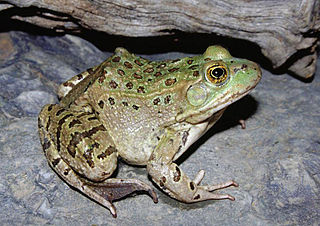
The Chiricahua leopard frog is a species of frog in the family Ranidae, the true frogs.
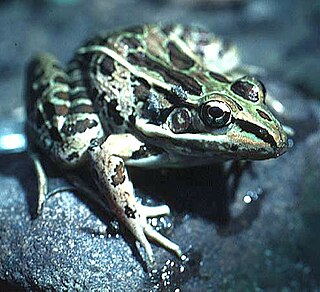
Forrer's grass frog or Forrer's leopard frog, Lithobates forreri, is a species of frog in the family Ranidae found in Mexico and Central America through Guatemala, El Salvador, Honduras, and Nicaragua to Costa Rica. It is a widespread and common frog found in lowland and seasonal tropical forests. It can also adapt to man-made habitats such as flooded agricultural lands and other water content systems. Reproduction requires permanent pools and lagoons.
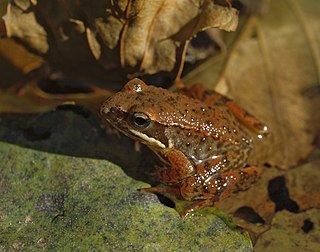
The Iberian frog, also known as Iberian stream frog, is a species of frog in the family Ranidae found in Portugal and Spain. Its natural habitats are rivers, mountain streams and swamps. It is threatened by habitat loss, introduced species, climate change, water contamination, and increased ultraviolet radiation.
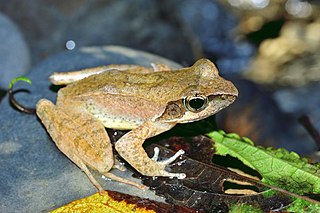
Rana sauteri is a species of true frog endemic to Taiwan. It inhabits low-altitude hill forests and the associated streams. It is an endangered species threatened by habitat loss due to agriculture and infrastructure development. Common names recorded for Rana sauteri include Kanshirei Village frog, Taiwan groove-toed frog, Sauter's brown frog, and Taiwan pseudotorrent frog.
The Maya Mountains frog is a species of frog in the family Ranidae found in Belize and possibly Guatemala. Its natural habitats are subtropical or tropical moist lowland forests, moist savanna, and rivers. This anuran is found primarily in the Mayan Mountain region between 100m and 915m of elevation.

The relict leopard frog is a species of frog in the family Ranidae, endemic to the United States. It is found along the Colorado river in extreme northwestern Arizona, and adjacent Nevada and southwestern Utah, although its present range seems to be restricted to the Lake Mead National Recreation Area. Its natural habitat is freshwater springs and their outlets. It is threatened by habitat loss to agriculture and water development as well as invasive species.

The Hokkaidō frog or the Ezo brown frog is a species in the family Ranidae found in Hokkaidō, Japan, and Sakhalin, Russia. Its natural habitats are boreal forests, temperate forests, temperate shrubland, temperate grassland, rivers, swamps, intermittent freshwater lakes, freshwater marshes, intermittent freshwater marshes, arable land, ponds, and irrigated land.

The Kampira Falls frog, also known as the Yaeyama harpist frog or harpist brown frog, is a species in the true frog family (Ranidae). Until recently known as Rana psaltes, it is found on Ishigaki and Iriomote in the Yaeyama Islands of Japan, as well as on Taiwan.

The Tago's brown frog or simply Tago frog is a species of frog in the family Ranidae endemic to Japan. It is widely distributed within Japan and found on Honshu, Shikoku, and Kyushu, as well as on some outlying islands. There are two subspecies:

Vaillant's frog is a species of frog in the family Ranidae found in Central America. Its natural habitats are subtropical or tropical dry forests, subtropical or tropical moist lowland forests, subtropical or tropical swamps, rivers, swamps, freshwater lakes, intermittent freshwater lakes, freshwater marshes, intermittent freshwater marshes, rural gardens, heavily degraded former forests, water storage areas, ponds, and canals and ditches.

The lowland leopard frog is a species of frog in the family Ranidae that is found in Mexico and the United States.

The Korean brown frog is a species of frog in the genus Rana. It is native to the Korean Peninsula and Shandong, China.


















